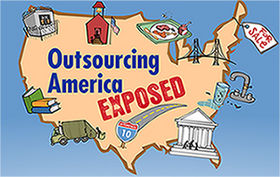
Help Us Expose the Privatizers and Profiteers
Selling out Our Democracy
Selling out Our Democracy
Portal:Outsourcing America Exposed
The Outsourcing America Exposed Portal
Featured Outsourcing Company
K12 Inc. For-Profit Cyber Schools
K12 Inc. is a publicly-traded (NYSE: LRN) for-profit, online education company headquartered in Herndon, Virginia. As K12 Inc. notes in its most recent annual report, "most of (its) revenues depend on per pupil funding amounts and payment formulas" from government contracts for virtual public charter schools and "blended schools" (combining online with traditional instruction) among other products. In 2013, K12 Inc. took in $848.2 million from its business, with $730.8 million coming from its "managed public schools" and thus the U.S. taxpayer.[1]K12 Inc. was founded by former Goldman Sachsexecutive Ron Packard and former United States Secretary of Education and right-wing talk show host William Bennett in 1999.[2][3] Packard was able to start K12 Inc. with $10 million from convicted junk-bond king Michael Milken and $30 million more from other Wall Street investors.[4][5] For more on this, read the PRWatch investigation: "From Junk Bonds to Junk Schools: Cyber Schools Fleece Taxpayers for Phantom Students and Failing Grades", October 2013.
K12 Inc. on its own and as a member of the American Legislative Exchange Council (ALEC), has pushed a national agenda to replace bricks and mortar classrooms with computers and replace actual teachers with "virtual" teachers. K12 Inc. operated 58 full-time virtual schools and enrolled close to 77,000 students in the 2010-2011 school year, according to a May 2013 report by the National Education Policy Center (NEPC, a research organization at the University of Colorado at Boulder).[6] Many have questioned the company's extraordinary revenue and profit levels, largely generated at taxpayers' expense.[1][7]
Although K12 Inc. was born on Wall Street, some on Wall Street have turned against the model. As of September 2013, hedge fund manager Whitney Tilson announced he was shorting K12 Inc. stock, effectively betting that the company would fail with an unsustainable education model.[8][9] Tilson said in a September 2013 presentation document that although average revenues per student are on the rise and the concept of online education has "strong political support, especially among Republicans" as well as "enormous buzz," "K12's aggressive student recruitment has led to dismal academic results by students and sky-high dropout rates, in some cases more than 50% annually" and "there have been so many regulatory issues and accusations of malfeasance that I'm convinced the problems are endemic."[10]
The efficacy of the model has also been questioned by the company's shareholders in a lawsuit alleging that the firm violated securities law by making false statements to investors about students' performance on standardized tests and boosting its enrollment and revenues through "deceptive recruiting," according to the Washington Post(see below for more).[11]
For many years, there was simply no data on virtual school performance. In 2012-13, state data became available indicating poor student achievement, as well as high student turnover, high student-teacher radios, uncertified teachers in some states (such as Florida),[12] and a funding formula that often gives companies extended periods of public funds for a child when the child may only stay at the cyber school for a brief period of time.[6] This new information has led some educators to call for a moratorium on the growth of full-time charter schools until policy-makers can assess the reasons for their significant failure to educate children.[13] Educators also question the appropriateness of taking children as young as five out of a classroom of their peers and putting them in front of a computer screen.[14][15] Low-paid teachers can be assigned as many as 250 students at a time -- as they were at Agora Cyber Charter School in Pennsylvania, according to the New York Times -- and they communicate with their pupils rarely, primarily online and sometimes by phone.[7]


